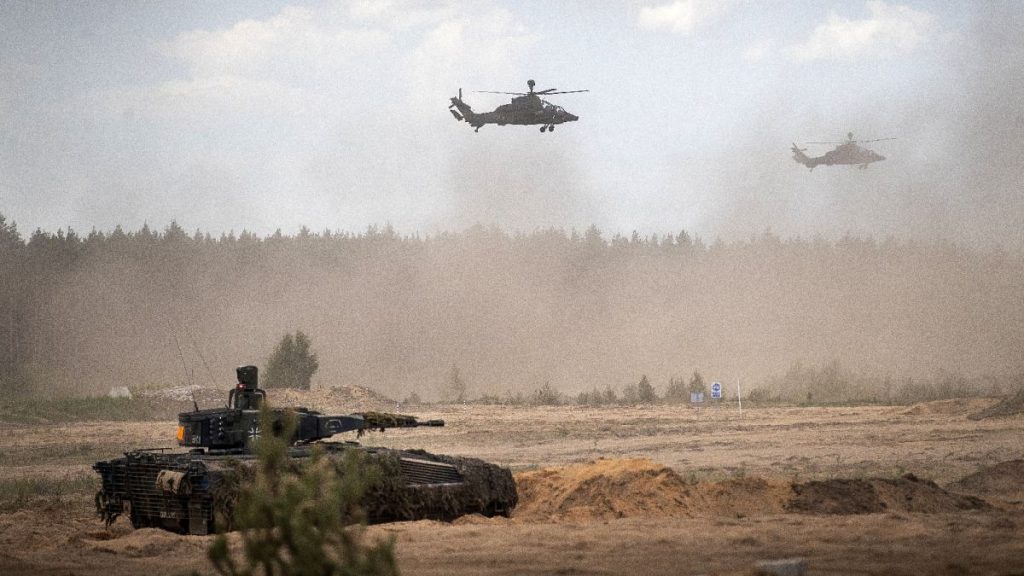Summarize this content to 2000 words in 6 paragraphs in Arabic
The multipolarisation of the international order is challenging the EU’s liberal vision with Donald Trump’s return to the White House likely to accelerate the trend, a key report found.
ADVERTISEMENTThe EU is facing a “perfect storm” of crises threatening its security, economic, and ideological models that it can weather only if it boosts defence spending and trade ties with other regions, the Munich Security Report 2025 warns.The annual report, released on Monday, days before world leaders, ministers and defence executives meet at the Munich Security Conference, states that the negative effects of the multipolarisation of the international order appear to be prevailing and particularly challenging the EU’s vision for the world.On the defence side, it notes that “Russia’s war against Ukraine has destroyed Europe’s cooperative security architecture” and that Donald Trump’s return to the White House is “compounding the crisis”.Moscow’s large-scale invasion of its neighbour jolted EU countries into spending more on their defence, with most of the member states that are also part of NATO and that had been failing to meet the military alliance’s defence spending target of 2% of GDP, now meeting it.”Yet these increases remain insufficient, given Ukraine’s needs and warnings that Russia could expand its war effort into NATO territory within five to eight years,” the report says, also noting that the new US administration has been forceful in its messaging to get the bloc to assume greater responsibility for its security.Trump has for instance called for the NATO spending target to be raised to 5%, a threshold no ally currently meets. He has also said he would encourage Russia to “do whatever the hell they want” to allies who don’t pay enough. The EU, the report argues, must find ways to boost spending further despite fiscal constraints, overcome the fragmentation of its defence industrial base, and deepen cooperation with third countries, notably Norway and the UK.Leaders from the 27-country bloc are currently wrestling with the issue of how to boost spending and production with multiple options on the table as estimates put the financial gap to plug at €500 billion over the coming decade. These include expanding the mandate of the European Investment Bank and relaxing Environmental, Social, and Governance (ESG) rules for private European banks so that they can invest more more defence projects, as well as issuing so-called Eurobonds to raise funds. Leaders also tasked the European Commission at an informal retreat earlier this month to look into bending the bloc’s fiscal rules to exclude defence spending from their national expenditures.A White Paper on defence detailing the military capabilities the bloc needs and the various options to finance them is to be released on March 19.The new geopolitical reality is also weakening the EU’s traditional economic model, the report says, with Trump’s electoral victory likely to accelerate the trend.The US President has threatened to slap tariffs on the EU, and announced on Sunday he would impose a 25% tariff on any steel and aluminium coming to the US, which could impact the bloc too. US tariffs on China would also have far-reaching negative consequences for the EU, according to the report, as it could lead Beijing to intensify “market-distorting practices of flooding the European market with cheap, heavily subsidized exports”.Furthermore, the tit-for-tat approach favoured by Washington, Beijing and Moscow is leading to a breakdown of international organisations, including the World Trade Organisation, the report says.According to the authors, the EU must diversify its trade relations and forge new partnerships with countries of the so-called Global South and possibly accept “painful concessions” to strike those deals, a feat that appears difficult given the current hand-wringing over the Mercosur deal. ADVERTISEMENTBut the bloc also faces internal ideological headwinds, exacerbated by external interference. The far right is now in government in seven member states and has a sizeable delegation at the European Parliament, challenging the liberal democratic model the bloc has championed since its inception. The two-biggest member states – France and Germany – are not spared with the Rassemblement National and the Alternative for Germany parties wielding considerable power in the public and political discourse. This ideological splintering could hinder the EU’s unity and decision-making at this crucial moment in its history, the report states.Overall, among the G7 countries, only the US believes it will be more secure and wealthy in ten years’ time while the perceived risk posed by the US increased sharply following Trump’s election, especially in Germany and Canada. ADVERTISEMENTMultiple EU officials will attend the Munich Security Conference held from February 14 to 16, including Commission chief Ursula vond er Leyen, Defence Commissioner Andrius Kubilius, and top diplomat Kaja Kallas.JD Vance, the US’ vice-president, and Keith Kellogg, Washington’s Ukraine-Russia envoy, as well as Ukrainian President Volodymyr Zelenskyy, are also expected to take part.
rewrite this title in Arabic ‘Perfect storm’ of crises threatening EU’s security and economic models, report warns
مقالات ذات صلة
مال واعمال
مواضيع رائجة
النشرة البريدية
اشترك للحصول على اخر الأخبار لحظة بلحظة الى بريدك الإلكتروني.
© 2025 جلوب تايم لاين. جميع الحقوق محفوظة.


